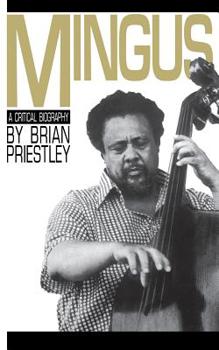Mingus, a Critical Biography
Select Format
Select Condition 
Book Overview
It would be no exaggeration to call Charles Mingus the greatest bass player in the history of jazz; indeed, some might even regard it as understatement, for the hurricane power of his work as a composer, teacher, band leader, and iconoclast reached far beyond jazz while remaining true to its heritage in the music of Duke Ellington, Charlie Parker, and Thelonious Monk. In this new biography Brian Priestley has written a masterly study of Mingus's dynamic...
Format:Paperback
Language:English
ISBN:0306802171
ISBN13:9780306802171
Release Date:March 1984
Publisher:Da Capo Press
Length:336 Pages
Weight:0.85 lbs.
Dimensions:0.8" x 5.4" x 8.3"
Customer Reviews
3 ratings
Homework Done. Author Knows The World Of Mingus.
Published by Thriftbooks.com User , 16 years ago
This is a well structured and in depth written piece of work. The extreme research and interviews that has been done on Charles Mingus is evident here. Priestley covers the many ensembles that Mingus had, along with recordings, stories and a very extensive discography. The book also contains some rare photo's and goes into detail about his relationship with Sue Graham (Mingus). There is an abundance of information from his right hand man, the great drummer Dannie Richmond. All in all I really enjoyed this book from cover to cover and do highly recommend it to any Mingus and jazz fan. It is a splendid read. I intend to read (Beneath The Underdog) and fully realize that it is a no holds barred piece of work and to be read as a piece of art literature in itself. I am also ready the Sue Graham Mingus book on their relationship titled (Tonight At Noon) published by Da Capo Press. I would firstly recommend this book (Mingus, A Critical Biography) by Brian Priestley as a solid foundational starting point. Grab it, you won't get a reader's cramp with this one.
Giant of Jazz
Published by Thriftbooks.com User , 23 years ago
This is a slightly disappointing, but still very good biography of one of the greatest jazz composers and probably its top bassist. Mingus, using a mixture of jazz, blues, church music, European impressionism and march music, and folk, wrote some of the most outstanding music of the 20th century. A man of wide-ranging, complicated emotions, lionesque appetites, and varied intellectual and creative pursuits, this titan of modern music is a fascinating biographical subject. However, Brian Priestley does not capture the full measure of the man and his music. I'm not sure what the subtitle "A Critical Biography" is meant to convey, but there is not enough musical criticism. Particularly in the second half of the book, Priestley resorts to an "and then he wrote" approach, painstakingly detailing every new composition or derivative, and every new musician in the ever-changing Mingus ensemble. There is musical analysis, but often it is more technical than critical. Referring to a song on "East Coasting" Priestley writes, "it incorporates passages of G minor twelve-bar blues only slightly different from the opening of `Eulogy' (Im/bVImaj\bII7\V7 instead of Im|bVImaj7\IIm7b5\v7)." The first part of this sentence is the more revealing: "It is a tribute to Mingus' maturing methodology that ideas are shown to be capable of repetition and rearrangement."This does not go far enough, though. Why did Mingus "cross-breed" so many of his works, as Priestley notes but never really examines. The reasons (aesthetic, psychological--practical in the case of "Slop") for the similarities among some works (e.g., "Better Get Hit Into Yo Soul", "Wednesday Night Prayer Meeting", "Slop," and other compositions is never really explored. Were Mingus' edits across versions and his reworking of similar themes an attempt to forge a new "traditional" folk music within a mere two decades? (Perhaps this hypothesis is off, but I would have preferred that Priestley write a more encompassing analysis of both the whole of Mingus' work and its constituent parts.)Conversely, we may praise the author for not indulging in psycho-biography, for including extensive well-documented quotes from Mingus as well as other musicians, and for describing enough on-stage Mingus behavior to get a sense of his personality. One might want to read the excellent though brief "Mingus/Mingus: Two Memoirs" for a better look at the offstage Mingus and his relationships with non-musicians.The strength of the book is the extensive documentation of the entire Mingus discography, the ever shifting lineups, and both the recorded and non-recorded performances. This must have been a labor of love, as Priestley gives the definitive record of Mingus' output and how the performances map onto the different albums. The appendices include musical notations of ten (!) bass excerpts, a second-by-second structural analysis of "The Black Saint...,"and notes to all citations in the book. This is invaluable for the Mingus f
Definitive Mingus Biography.
Published by Thriftbooks.com User , 26 years ago
The reviewer from LA makes this book sound like a cheesy celebrity bio. Nothing could be further from the truth. Priestly has written a carefully detailed history of Mingus's musical life. There's an effort to make sense out of Mingus's wild autobiography Beneath the Underdog, and his personal life is discussed, as it should be, but Mingus's accomlishments and his place in jazz history are the main focus of this book. This is a first rate jazz biography.






